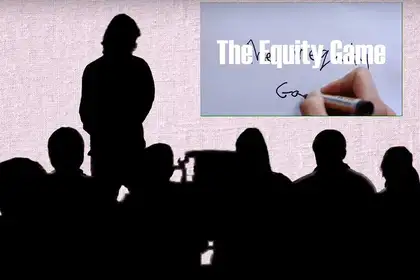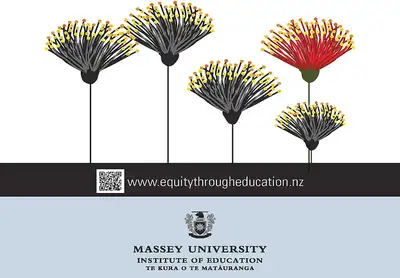
Pupils from Avalon Intermediate made a rap video about their views on education for the symposium.
A YouTube video on equity in education put the youth voice at the heart of a symposium on the topic at Massey University recently, with a rap by a group of intermediate pupils about how education can be unfair.
Pupils from Avalon Intermediate School in Lower Hutt rapped that when you sit in the back row of the education system, “that’s unfair, we’re further away. It’s longer to throw and harder to see. This is an example of inequity.”
Learning to appreciate children’s imaginative know-how, and to listen to youth voices in order for human rights to be enacted in our society and education system were among hot topics at the recent Equity Through Education symposium run by the Institute of Education’s research centre at Massey’s Auckland campus.
It is the second year for the event, which brought together around 400 education and agency professionals working with youth to share knowledge and explore new thinking and developments on access to quality education for New Zealand’s increasingly diverse population.
Organisers Associate Professors Alison Kearney and Mandia Mentis say the symposium – and the on-going work of the Massey research centre group behind it – aims to help communities to address and find solutions to inequalities relating to culture, gender, ethnicity, socio-economic or health factors that can affect children’s educational and life chances.
Keynote speakers included David Epston, a renowned narrative therapist and co-director of the Family Therapy Centre in Auckland. He gave a presentation about professionals working respectfully with young people and their families by drawing on their ‘knowledges of experience’ to help them identify solutions to the challenges they encounter.
Representing youth perspectives and the need for research by, with and for children, were keynote speakers Amandie Weerasundara (Save the Children New Zealand) and Ethyn Sturm (Unicef NZ) both of whom helped to develop, analyse and write the Our Voices, Our Rights report, which was presented to the United Nations Committee on the Rights of the Child.
Dr Kathleen Logan, from the Office of the Children’s Commissioner, gave a keynote speech on youth consultation on issues that matter in public policy, and normalising the idea that government departments should consult children on policies that affect them as a matter of course.

Massey's Equity Through Education research centre works with the wider education sector, as well as communities and schools.
Addressing the challenges of equity in education
Workshops and discussions on a plethora of topics under the headings of professional practice, partnerships and children’s rights ran throughout the day, and included such issues as culturally responsive education for Pasifika students; modern learning environments; education access for refugees; the impact of inadequate sex education; and Māori perspectives on learning.
The specially commissioned video launched at the event and featuring The Equity Game rap was coordinated by Associate Professor Tracy Riley, who worked with Paascalino Schaller, a music teacher at Avalon Intermediate School and a digital music and video producer. It includes interviews with teachers, academics and young people about the importance of education as a vehicle for equity.
Dr Kearney says Equity Through Education is a national and international hub for researchers and activists who work with communities to address the challenges of equity within the education sector. “We research methods and models for educational change where we work alongside communities of parents, educators, advocates, learners and researchers both within and outside formal education.”
Check the Equity Through Education YouTube video here and their website here.